London Law LLP Internship Assignment: Law, Governance and Employment
VerifiedAdded on 2023/01/12
|9
|2348
|64
Report
AI Summary
This report analyzes a law internship assignment, addressing key legal concepts relevant to a commercial law firm. It begins by examining the roles of the executive, judiciary, and legislature. The report then delves into the remedy of specific performance in contract law, including its limitations and relevant case law. A comparison between general partnerships and companies is provided, focusing on separate legal personality and limited liability. Finally, the report discusses the ethical considerations surrounding employee dismissal, referencing relevant legislation and case law to provide a comprehensive overview of the legal topics covered in the assignment.

London law LLP
Internship
Internship
Paraphrase This Document
Need a fresh take? Get an instant paraphrase of this document with our AI Paraphraser
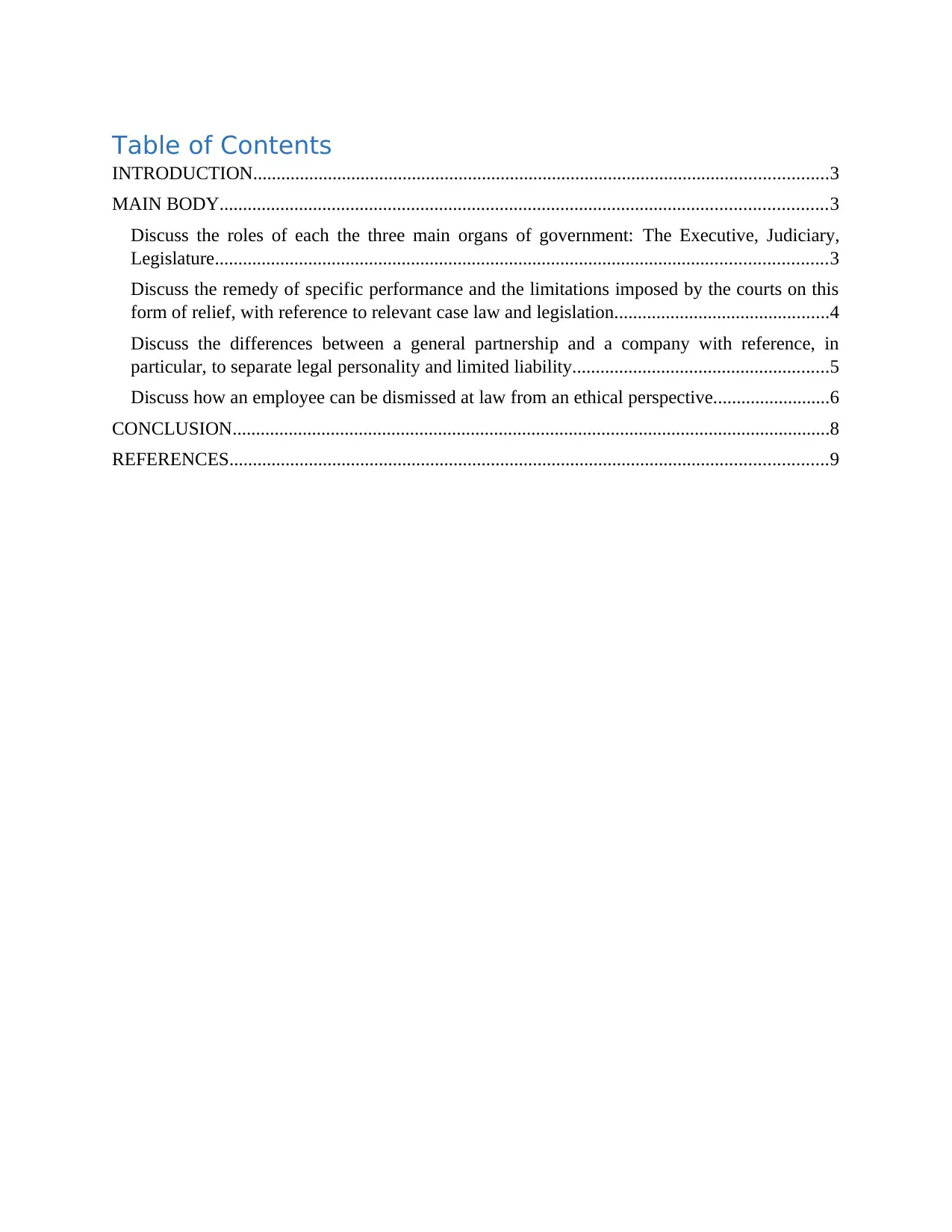
Table of Contents
INTRODUCTION...........................................................................................................................3
MAIN BODY..................................................................................................................................3
Discuss the roles of each the three main organs of government: The Executive, Judiciary,
Legislature...................................................................................................................................3
Discuss the remedy of specific performance and the limitations imposed by the courts on this
form of relief, with reference to relevant case law and legislation..............................................4
Discuss the differences between a general partnership and a company with reference, in
particular, to separate legal personality and limited liability.......................................................5
Discuss how an employee can be dismissed at law from an ethical perspective.........................6
CONCLUSION................................................................................................................................8
REFERENCES................................................................................................................................9
INTRODUCTION...........................................................................................................................3
MAIN BODY..................................................................................................................................3
Discuss the roles of each the three main organs of government: The Executive, Judiciary,
Legislature...................................................................................................................................3
Discuss the remedy of specific performance and the limitations imposed by the courts on this
form of relief, with reference to relevant case law and legislation..............................................4
Discuss the differences between a general partnership and a company with reference, in
particular, to separate legal personality and limited liability.......................................................5
Discuss how an employee can be dismissed at law from an ethical perspective.........................6
CONCLUSION................................................................................................................................8
REFERENCES................................................................................................................................9
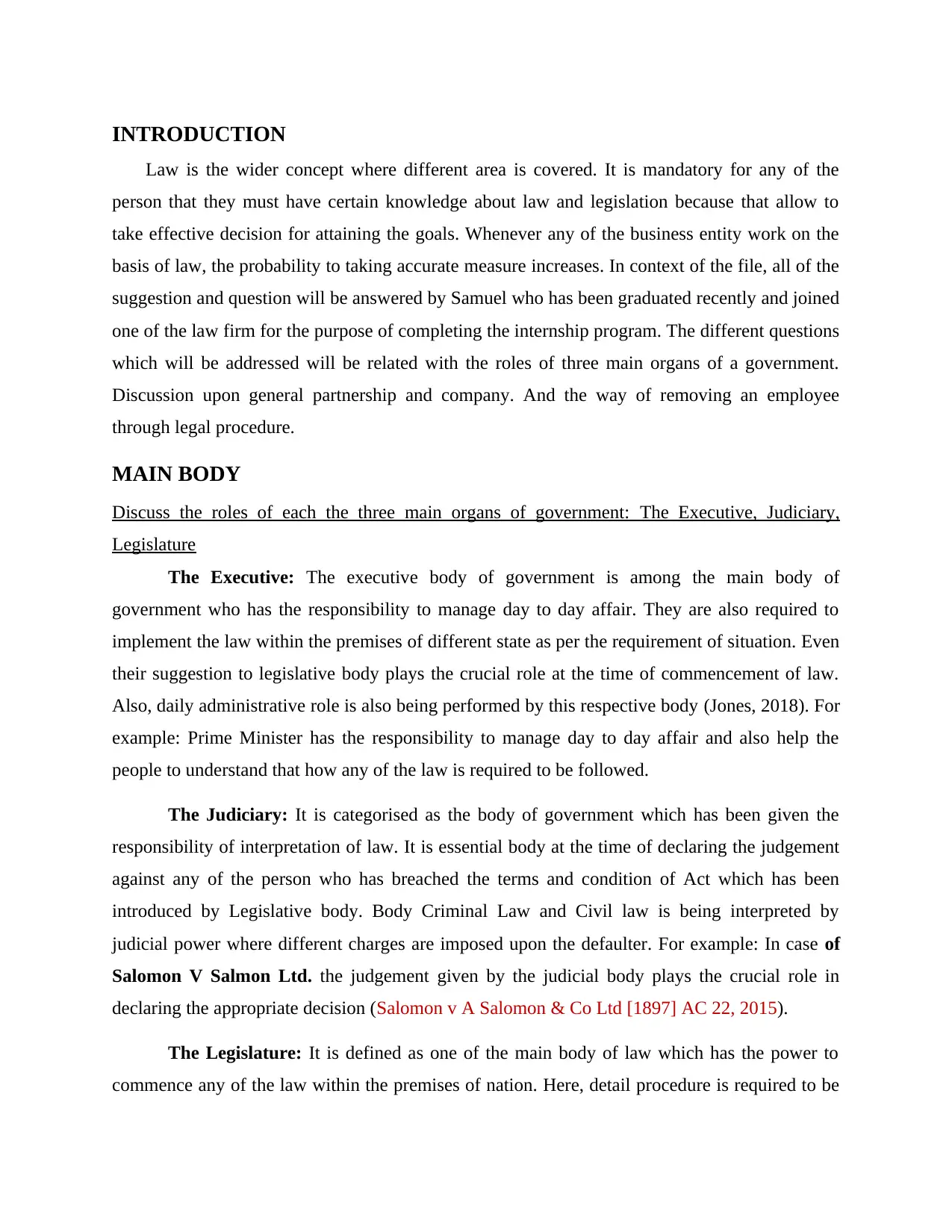
INTRODUCTION
Law is the wider concept where different area is covered. It is mandatory for any of the
person that they must have certain knowledge about law and legislation because that allow to
take effective decision for attaining the goals. Whenever any of the business entity work on the
basis of law, the probability to taking accurate measure increases. In context of the file, all of the
suggestion and question will be answered by Samuel who has been graduated recently and joined
one of the law firm for the purpose of completing the internship program. The different questions
which will be addressed will be related with the roles of three main organs of a government.
Discussion upon general partnership and company. And the way of removing an employee
through legal procedure.
MAIN BODY
Discuss the roles of each the three main organs of government: The Executive, Judiciary,
Legislature
The Executive: The executive body of government is among the main body of
government who has the responsibility to manage day to day affair. They are also required to
implement the law within the premises of different state as per the requirement of situation. Even
their suggestion to legislative body plays the crucial role at the time of commencement of law.
Also, daily administrative role is also being performed by this respective body (Jones, 2018). For
example: Prime Minister has the responsibility to manage day to day affair and also help the
people to understand that how any of the law is required to be followed.
The Judiciary: It is categorised as the body of government which has been given the
responsibility of interpretation of law. It is essential body at the time of declaring the judgement
against any of the person who has breached the terms and condition of Act which has been
introduced by Legislative body. Body Criminal Law and Civil law is being interpreted by
judicial power where different charges are imposed upon the defaulter. For example: In case of
Salomon V Salmon Ltd. the judgement given by the judicial body plays the crucial role in
declaring the appropriate decision (Salomon v A Salomon & Co Ltd [1897] AC 22, 2015).
The Legislature: It is defined as one of the main body of law which has the power to
commence any of the law within the premises of nation. Here, detail procedure is required to be
Law is the wider concept where different area is covered. It is mandatory for any of the
person that they must have certain knowledge about law and legislation because that allow to
take effective decision for attaining the goals. Whenever any of the business entity work on the
basis of law, the probability to taking accurate measure increases. In context of the file, all of the
suggestion and question will be answered by Samuel who has been graduated recently and joined
one of the law firm for the purpose of completing the internship program. The different questions
which will be addressed will be related with the roles of three main organs of a government.
Discussion upon general partnership and company. And the way of removing an employee
through legal procedure.
MAIN BODY
Discuss the roles of each the three main organs of government: The Executive, Judiciary,
Legislature
The Executive: The executive body of government is among the main body of
government who has the responsibility to manage day to day affair. They are also required to
implement the law within the premises of different state as per the requirement of situation. Even
their suggestion to legislative body plays the crucial role at the time of commencement of law.
Also, daily administrative role is also being performed by this respective body (Jones, 2018). For
example: Prime Minister has the responsibility to manage day to day affair and also help the
people to understand that how any of the law is required to be followed.
The Judiciary: It is categorised as the body of government which has been given the
responsibility of interpretation of law. It is essential body at the time of declaring the judgement
against any of the person who has breached the terms and condition of Act which has been
introduced by Legislative body. Body Criminal Law and Civil law is being interpreted by
judicial power where different charges are imposed upon the defaulter. For example: In case of
Salomon V Salmon Ltd. the judgement given by the judicial body plays the crucial role in
declaring the appropriate decision (Salomon v A Salomon & Co Ltd [1897] AC 22, 2015).
The Legislature: It is defined as one of the main body of law which has the power to
commence any of the law within the premises of nation. Here, detail procedure is required to be
⊘ This is a preview!⊘
Do you want full access?
Subscribe today to unlock all pages.

Trusted by 1+ million students worldwide
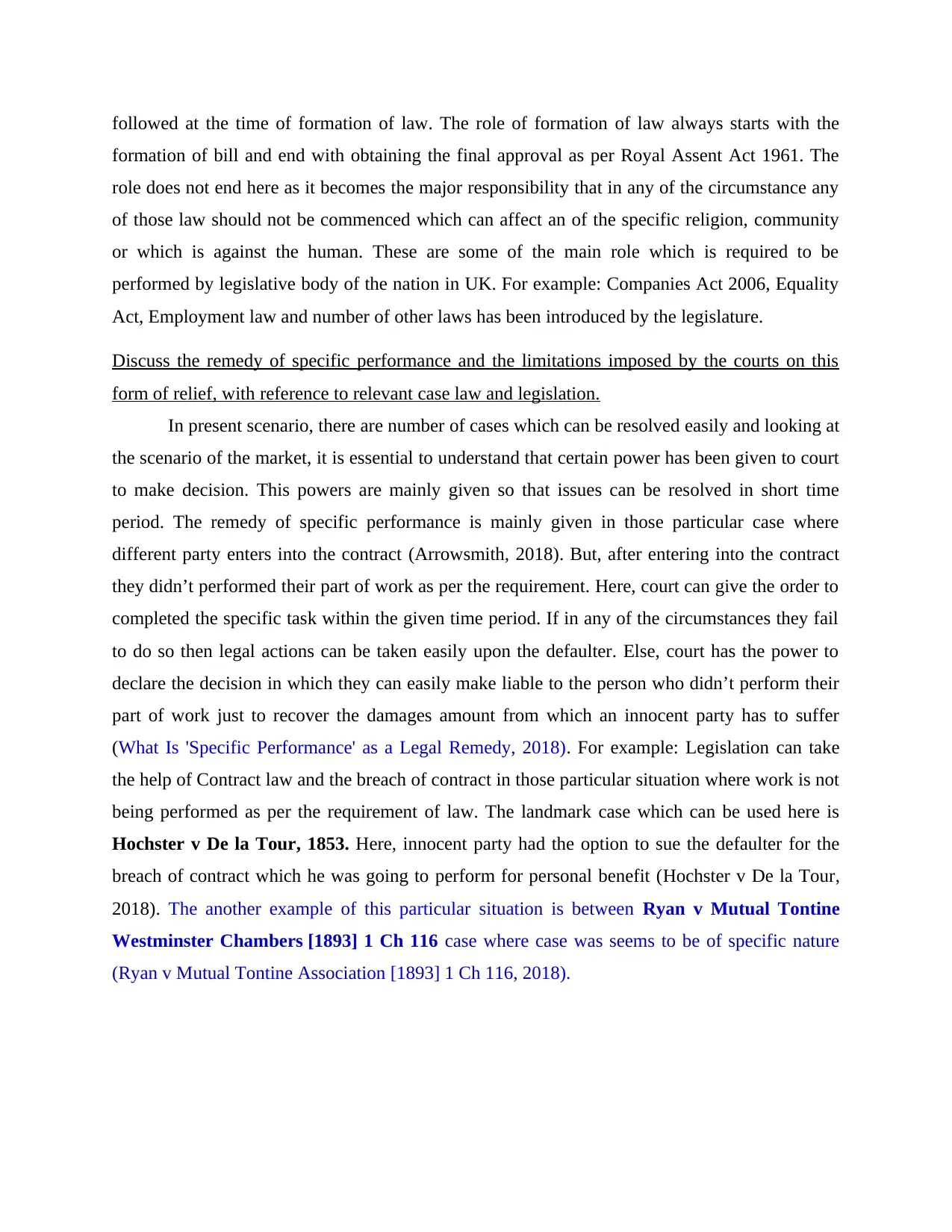
followed at the time of formation of law. The role of formation of law always starts with the
formation of bill and end with obtaining the final approval as per Royal Assent Act 1961. The
role does not end here as it becomes the major responsibility that in any of the circumstance any
of those law should not be commenced which can affect an of the specific religion, community
or which is against the human. These are some of the main role which is required to be
performed by legislative body of the nation in UK. For example: Companies Act 2006, Equality
Act, Employment law and number of other laws has been introduced by the legislature.
Discuss the remedy of specific performance and the limitations imposed by the courts on this
form of relief, with reference to relevant case law and legislation.
In present scenario, there are number of cases which can be resolved easily and looking at
the scenario of the market, it is essential to understand that certain power has been given to court
to make decision. This powers are mainly given so that issues can be resolved in short time
period. The remedy of specific performance is mainly given in those particular case where
different party enters into the contract (Arrowsmith, 2018). But, after entering into the contract
they didn’t performed their part of work as per the requirement. Here, court can give the order to
completed the specific task within the given time period. If in any of the circumstances they fail
to do so then legal actions can be taken easily upon the defaulter. Else, court has the power to
declare the decision in which they can easily make liable to the person who didn’t perform their
part of work just to recover the damages amount from which an innocent party has to suffer
(What Is 'Specific Performance' as a Legal Remedy, 2018). For example: Legislation can take
the help of Contract law and the breach of contract in those particular situation where work is not
being performed as per the requirement of law. The landmark case which can be used here is
Hochster v De la Tour, 1853. Here, innocent party had the option to sue the defaulter for the
breach of contract which he was going to perform for personal benefit (Hochster v De la Tour,
2018). The another example of this particular situation is between Ryan v Mutual Tontine
Westminster Chambers [1893] 1 Ch 116 case where case was seems to be of specific nature
(Ryan v Mutual Tontine Association [1893] 1 Ch 116, 2018).
formation of bill and end with obtaining the final approval as per Royal Assent Act 1961. The
role does not end here as it becomes the major responsibility that in any of the circumstance any
of those law should not be commenced which can affect an of the specific religion, community
or which is against the human. These are some of the main role which is required to be
performed by legislative body of the nation in UK. For example: Companies Act 2006, Equality
Act, Employment law and number of other laws has been introduced by the legislature.
Discuss the remedy of specific performance and the limitations imposed by the courts on this
form of relief, with reference to relevant case law and legislation.
In present scenario, there are number of cases which can be resolved easily and looking at
the scenario of the market, it is essential to understand that certain power has been given to court
to make decision. This powers are mainly given so that issues can be resolved in short time
period. The remedy of specific performance is mainly given in those particular case where
different party enters into the contract (Arrowsmith, 2018). But, after entering into the contract
they didn’t performed their part of work as per the requirement. Here, court can give the order to
completed the specific task within the given time period. If in any of the circumstances they fail
to do so then legal actions can be taken easily upon the defaulter. Else, court has the power to
declare the decision in which they can easily make liable to the person who didn’t perform their
part of work just to recover the damages amount from which an innocent party has to suffer
(What Is 'Specific Performance' as a Legal Remedy, 2018). For example: Legislation can take
the help of Contract law and the breach of contract in those particular situation where work is not
being performed as per the requirement of law. The landmark case which can be used here is
Hochster v De la Tour, 1853. Here, innocent party had the option to sue the defaulter for the
breach of contract which he was going to perform for personal benefit (Hochster v De la Tour,
2018). The another example of this particular situation is between Ryan v Mutual Tontine
Westminster Chambers [1893] 1 Ch 116 case where case was seems to be of specific nature
(Ryan v Mutual Tontine Association [1893] 1 Ch 116, 2018).
Paraphrase This Document
Need a fresh take? Get an instant paraphrase of this document with our AI Paraphraser
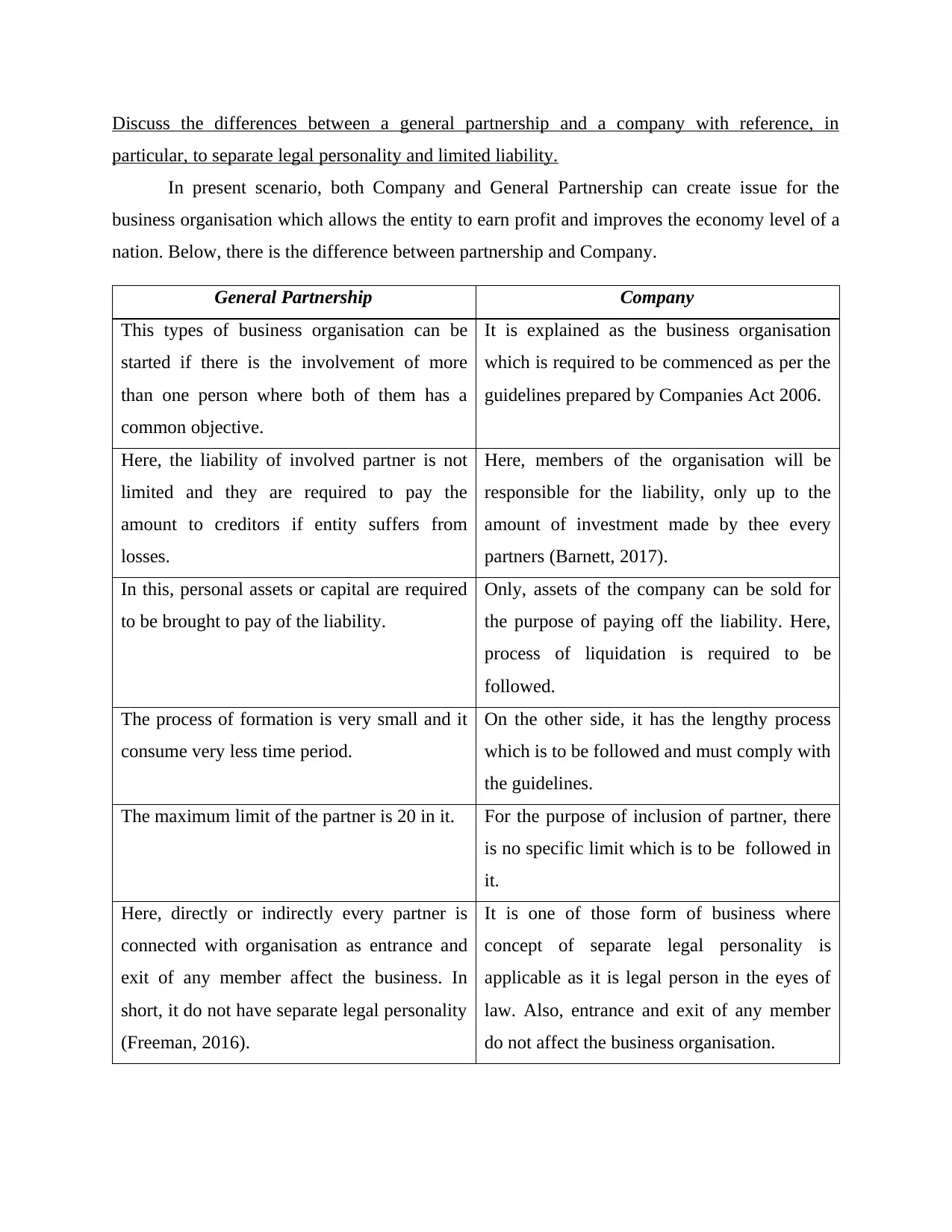
Discuss the differences between a general partnership and a company with reference, in
particular, to separate legal personality and limited liability.
In present scenario, both Company and General Partnership can create issue for the
business organisation which allows the entity to earn profit and improves the economy level of a
nation. Below, there is the difference between partnership and Company.
General Partnership Company
This types of business organisation can be
started if there is the involvement of more
than one person where both of them has a
common objective.
It is explained as the business organisation
which is required to be commenced as per the
guidelines prepared by Companies Act 2006.
Here, the liability of involved partner is not
limited and they are required to pay the
amount to creditors if entity suffers from
losses.
Here, members of the organisation will be
responsible for the liability, only up to the
amount of investment made by thee every
partners (Barnett, 2017).
In this, personal assets or capital are required
to be brought to pay of the liability.
Only, assets of the company can be sold for
the purpose of paying off the liability. Here,
process of liquidation is required to be
followed.
The process of formation is very small and it
consume very less time period.
On the other side, it has the lengthy process
which is to be followed and must comply with
the guidelines.
The maximum limit of the partner is 20 in it. For the purpose of inclusion of partner, there
is no specific limit which is to be followed in
it.
Here, directly or indirectly every partner is
connected with organisation as entrance and
exit of any member affect the business. In
short, it do not have separate legal personality
(Freeman, 2016).
It is one of those form of business where
concept of separate legal personality is
applicable as it is legal person in the eyes of
law. Also, entrance and exit of any member
do not affect the business organisation.
particular, to separate legal personality and limited liability.
In present scenario, both Company and General Partnership can create issue for the
business organisation which allows the entity to earn profit and improves the economy level of a
nation. Below, there is the difference between partnership and Company.
General Partnership Company
This types of business organisation can be
started if there is the involvement of more
than one person where both of them has a
common objective.
It is explained as the business organisation
which is required to be commenced as per the
guidelines prepared by Companies Act 2006.
Here, the liability of involved partner is not
limited and they are required to pay the
amount to creditors if entity suffers from
losses.
Here, members of the organisation will be
responsible for the liability, only up to the
amount of investment made by thee every
partners (Barnett, 2017).
In this, personal assets or capital are required
to be brought to pay of the liability.
Only, assets of the company can be sold for
the purpose of paying off the liability. Here,
process of liquidation is required to be
followed.
The process of formation is very small and it
consume very less time period.
On the other side, it has the lengthy process
which is to be followed and must comply with
the guidelines.
The maximum limit of the partner is 20 in it. For the purpose of inclusion of partner, there
is no specific limit which is to be followed in
it.
Here, directly or indirectly every partner is
connected with organisation as entrance and
exit of any member affect the business. In
short, it do not have separate legal personality
(Freeman, 2016).
It is one of those form of business where
concept of separate legal personality is
applicable as it is legal person in the eyes of
law. Also, entrance and exit of any member
do not affect the business organisation.
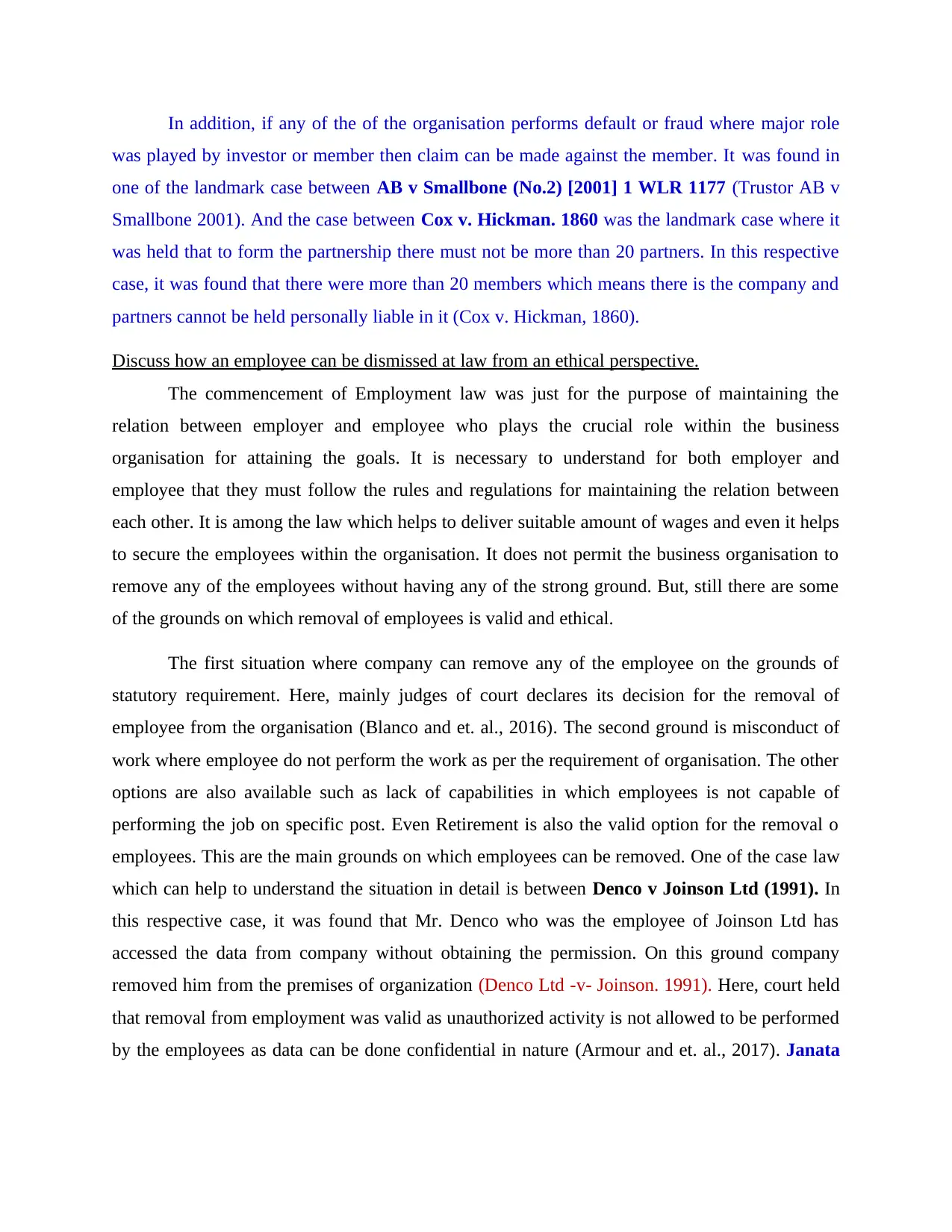
In addition, if any of the of the organisation performs default or fraud where major role
was played by investor or member then claim can be made against the member. It was found in
one of the landmark case between AB v Smallbone (No.2) [2001] 1 WLR 1177 (Trustor AB v
Smallbone 2001). And the case between Cox v. Hickman. 1860 was the landmark case where it
was held that to form the partnership there must not be more than 20 partners. In this respective
case, it was found that there were more than 20 members which means there is the company and
partners cannot be held personally liable in it (Cox v. Hickman, 1860).
Discuss how an employee can be dismissed at law from an ethical perspective.
The commencement of Employment law was just for the purpose of maintaining the
relation between employer and employee who plays the crucial role within the business
organisation for attaining the goals. It is necessary to understand for both employer and
employee that they must follow the rules and regulations for maintaining the relation between
each other. It is among the law which helps to deliver suitable amount of wages and even it helps
to secure the employees within the organisation. It does not permit the business organisation to
remove any of the employees without having any of the strong ground. But, still there are some
of the grounds on which removal of employees is valid and ethical.
The first situation where company can remove any of the employee on the grounds of
statutory requirement. Here, mainly judges of court declares its decision for the removal of
employee from the organisation (Blanco and et. al., 2016). The second ground is misconduct of
work where employee do not perform the work as per the requirement of organisation. The other
options are also available such as lack of capabilities in which employees is not capable of
performing the job on specific post. Even Retirement is also the valid option for the removal o
employees. This are the main grounds on which employees can be removed. One of the case law
which can help to understand the situation in detail is between Denco v Joinson Ltd (1991). In
this respective case, it was found that Mr. Denco who was the employee of Joinson Ltd has
accessed the data from company without obtaining the permission. On this ground company
removed him from the premises of organization (Denco Ltd -v- Joinson. 1991). Here, court held
that removal from employment was valid as unauthorized activity is not allowed to be performed
by the employees as data can be done confidential in nature (Armour and et. al., 2017). Janata
was played by investor or member then claim can be made against the member. It was found in
one of the landmark case between AB v Smallbone (No.2) [2001] 1 WLR 1177 (Trustor AB v
Smallbone 2001). And the case between Cox v. Hickman. 1860 was the landmark case where it
was held that to form the partnership there must not be more than 20 partners. In this respective
case, it was found that there were more than 20 members which means there is the company and
partners cannot be held personally liable in it (Cox v. Hickman, 1860).
Discuss how an employee can be dismissed at law from an ethical perspective.
The commencement of Employment law was just for the purpose of maintaining the
relation between employer and employee who plays the crucial role within the business
organisation for attaining the goals. It is necessary to understand for both employer and
employee that they must follow the rules and regulations for maintaining the relation between
each other. It is among the law which helps to deliver suitable amount of wages and even it helps
to secure the employees within the organisation. It does not permit the business organisation to
remove any of the employees without having any of the strong ground. But, still there are some
of the grounds on which removal of employees is valid and ethical.
The first situation where company can remove any of the employee on the grounds of
statutory requirement. Here, mainly judges of court declares its decision for the removal of
employee from the organisation (Blanco and et. al., 2016). The second ground is misconduct of
work where employee do not perform the work as per the requirement of organisation. The other
options are also available such as lack of capabilities in which employees is not capable of
performing the job on specific post. Even Retirement is also the valid option for the removal o
employees. This are the main grounds on which employees can be removed. One of the case law
which can help to understand the situation in detail is between Denco v Joinson Ltd (1991). In
this respective case, it was found that Mr. Denco who was the employee of Joinson Ltd has
accessed the data from company without obtaining the permission. On this ground company
removed him from the premises of organization (Denco Ltd -v- Joinson. 1991). Here, court held
that removal from employment was valid as unauthorized activity is not allowed to be performed
by the employees as data can be done confidential in nature (Armour and et. al., 2017). Janata
⊘ This is a preview!⊘
Do you want full access?
Subscribe today to unlock all pages.

Trusted by 1+ million students worldwide

Bank v Ahmed. is one the case where employee was removed ethically as Ahmed was unable
to perform his work ethical in required manner (Janata Bank v Ahmed, 1981).
to perform his work ethical in required manner (Janata Bank v Ahmed, 1981).
Paraphrase This Document
Need a fresh take? Get an instant paraphrase of this document with our AI Paraphraser
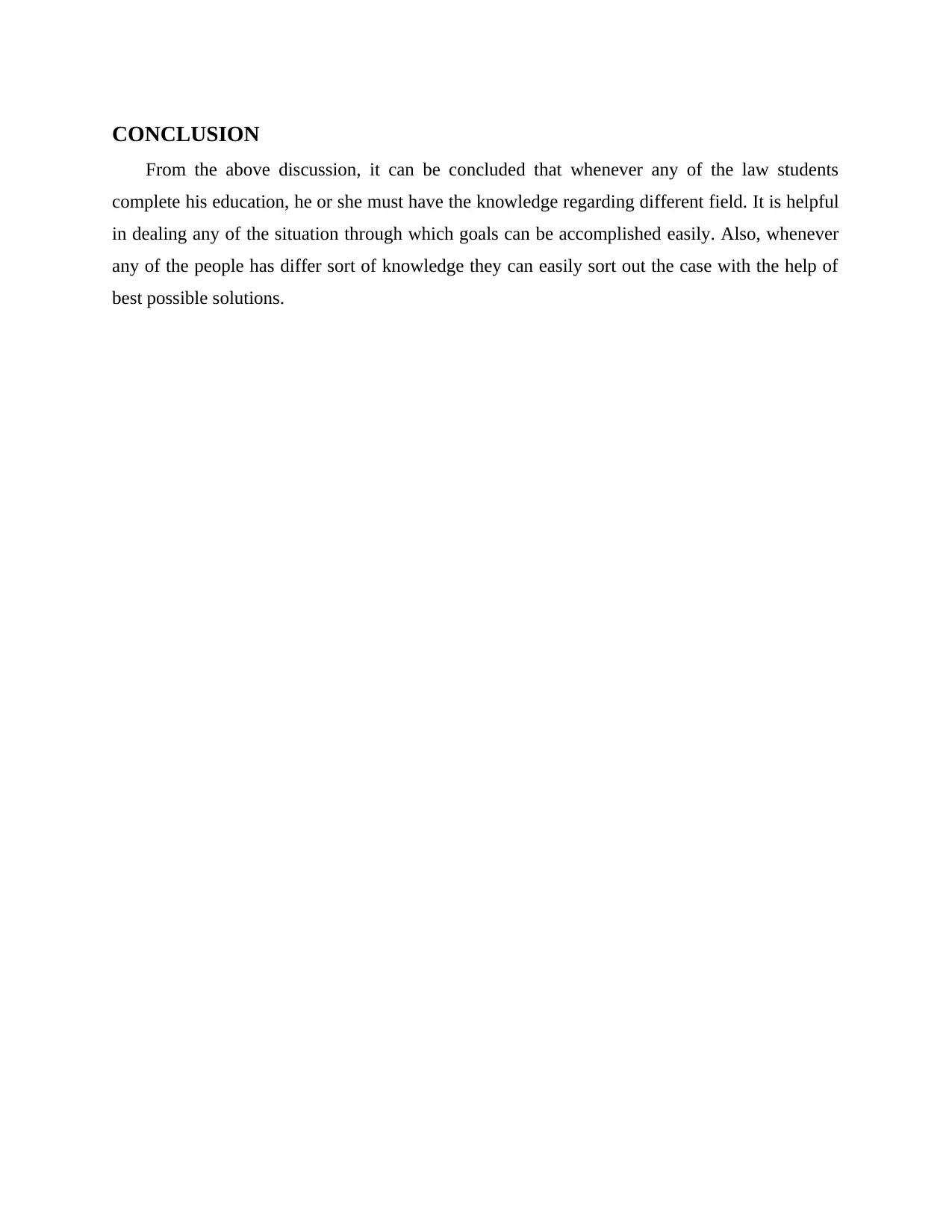
CONCLUSION
From the above discussion, it can be concluded that whenever any of the law students
complete his education, he or she must have the knowledge regarding different field. It is helpful
in dealing any of the situation through which goals can be accomplished easily. Also, whenever
any of the people has differ sort of knowledge they can easily sort out the case with the help of
best possible solutions.
From the above discussion, it can be concluded that whenever any of the law students
complete his education, he or she must have the knowledge regarding different field. It is helpful
in dealing any of the situation through which goals can be accomplished easily. Also, whenever
any of the people has differ sort of knowledge they can easily sort out the case with the help of
best possible solutions.
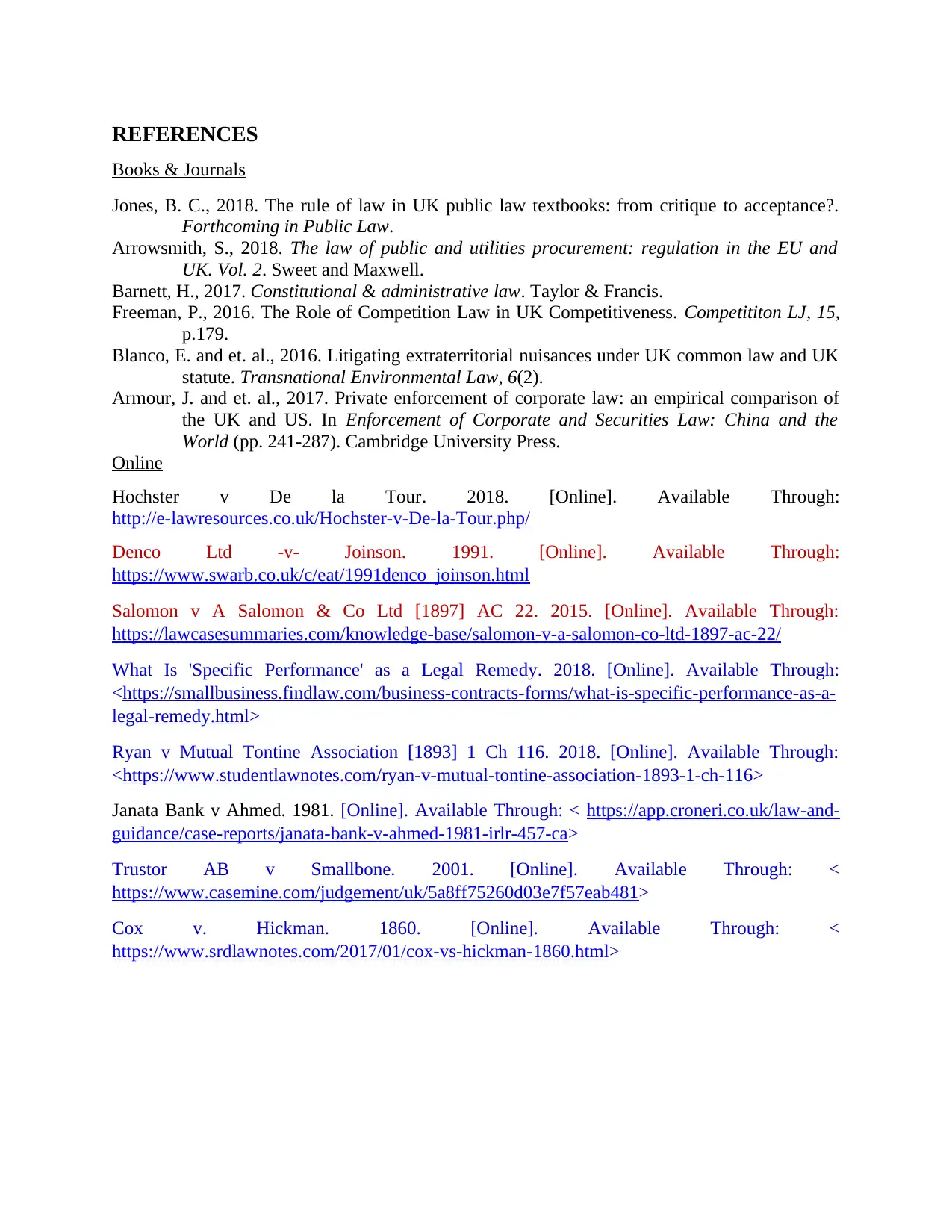
REFERENCES
Books & Journals
Jones, B. C., 2018. The rule of law in UK public law textbooks: from critique to acceptance?.
Forthcoming in Public Law.
Arrowsmith, S., 2018. The law of public and utilities procurement: regulation in the EU and
UK. Vol. 2. Sweet and Maxwell.
Barnett, H., 2017. Constitutional & administrative law. Taylor & Francis.
Freeman, P., 2016. The Role of Competition Law in UK Competitiveness. Competititon LJ, 15,
p.179.
Blanco, E. and et. al., 2016. Litigating extraterritorial nuisances under UK common law and UK
statute. Transnational Environmental Law, 6(2).
Armour, J. and et. al., 2017. Private enforcement of corporate law: an empirical comparison of
the UK and US. In Enforcement of Corporate and Securities Law: China and the
World (pp. 241-287). Cambridge University Press.
Online
Hochster v De la Tour. 2018. [Online]. Available Through:
http://e-lawresources.co.uk/Hochster-v-De-la-Tour.php/
Denco Ltd -v- Joinson. 1991. [Online]. Available Through:
https://www.swarb.co.uk/c/eat/1991denco_joinson.html
Salomon v A Salomon & Co Ltd [1897] AC 22. 2015. [Online]. Available Through:
https://lawcasesummaries.com/knowledge-base/salomon-v-a-salomon-co-ltd-1897-ac-22/
What Is 'Specific Performance' as a Legal Remedy. 2018. [Online]. Available Through:
<https://smallbusiness.findlaw.com/business-contracts-forms/what-is-specific-performance-as-a-
legal-remedy.html>
Ryan v Mutual Tontine Association [1893] 1 Ch 116. 2018. [Online]. Available Through:
<https://www.studentlawnotes.com/ryan-v-mutual-tontine-association-1893-1-ch-116>
Janata Bank v Ahmed. 1981. [Online]. Available Through: < https://app.croneri.co.uk/law-and-
guidance/case-reports/janata-bank-v-ahmed-1981-irlr-457-ca>
Trustor AB v Smallbone. 2001. [Online]. Available Through: <
https://www.casemine.com/judgement/uk/5a8ff75260d03e7f57eab481>
Cox v. Hickman. 1860. [Online]. Available Through: <
https://www.srdlawnotes.com/2017/01/cox-vs-hickman-1860.html>
Books & Journals
Jones, B. C., 2018. The rule of law in UK public law textbooks: from critique to acceptance?.
Forthcoming in Public Law.
Arrowsmith, S., 2018. The law of public and utilities procurement: regulation in the EU and
UK. Vol. 2. Sweet and Maxwell.
Barnett, H., 2017. Constitutional & administrative law. Taylor & Francis.
Freeman, P., 2016. The Role of Competition Law in UK Competitiveness. Competititon LJ, 15,
p.179.
Blanco, E. and et. al., 2016. Litigating extraterritorial nuisances under UK common law and UK
statute. Transnational Environmental Law, 6(2).
Armour, J. and et. al., 2017. Private enforcement of corporate law: an empirical comparison of
the UK and US. In Enforcement of Corporate and Securities Law: China and the
World (pp. 241-287). Cambridge University Press.
Online
Hochster v De la Tour. 2018. [Online]. Available Through:
http://e-lawresources.co.uk/Hochster-v-De-la-Tour.php/
Denco Ltd -v- Joinson. 1991. [Online]. Available Through:
https://www.swarb.co.uk/c/eat/1991denco_joinson.html
Salomon v A Salomon & Co Ltd [1897] AC 22. 2015. [Online]. Available Through:
https://lawcasesummaries.com/knowledge-base/salomon-v-a-salomon-co-ltd-1897-ac-22/
What Is 'Specific Performance' as a Legal Remedy. 2018. [Online]. Available Through:
<https://smallbusiness.findlaw.com/business-contracts-forms/what-is-specific-performance-as-a-
legal-remedy.html>
Ryan v Mutual Tontine Association [1893] 1 Ch 116. 2018. [Online]. Available Through:
<https://www.studentlawnotes.com/ryan-v-mutual-tontine-association-1893-1-ch-116>
Janata Bank v Ahmed. 1981. [Online]. Available Through: < https://app.croneri.co.uk/law-and-
guidance/case-reports/janata-bank-v-ahmed-1981-irlr-457-ca>
Trustor AB v Smallbone. 2001. [Online]. Available Through: <
https://www.casemine.com/judgement/uk/5a8ff75260d03e7f57eab481>
Cox v. Hickman. 1860. [Online]. Available Through: <
https://www.srdlawnotes.com/2017/01/cox-vs-hickman-1860.html>
⊘ This is a preview!⊘
Do you want full access?
Subscribe today to unlock all pages.

Trusted by 1+ million students worldwide
1 out of 9
Related Documents
Your All-in-One AI-Powered Toolkit for Academic Success.
+13062052269
info@desklib.com
Available 24*7 on WhatsApp / Email
![[object Object]](/_next/static/media/star-bottom.7253800d.svg)
Unlock your academic potential
Copyright © 2020–2025 A2Z Services. All Rights Reserved. Developed and managed by ZUCOL.





